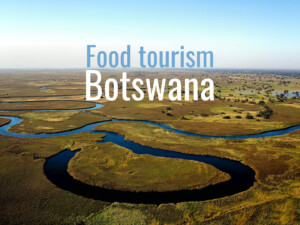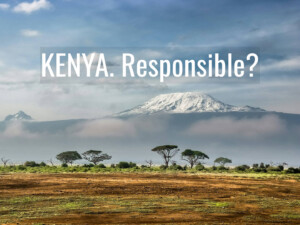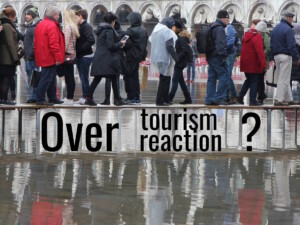Tourism and solidarity with Ghana & the developing world: Can they go hand in hand?

Is tourism from the developed world compatible with the developing world? Ceri Dingle believes so, and argues that if people could visit developing places without paternalistic pity and prejudice they would help support the sort of development and progress locals want.
Ms Dingle writes this “Good Tourism” Insight about her education charity WORLDwrite and its experiences in Ghana at the invitation of Tourism’s Horizon: Travel for the Millions, a “GT” Insight Partner.
Empathy vs pity
Empathy often precedes solidarity. As tourists, we frequently put ourselves in the shoes of others; sometimes even siding with them on our travels. This empathy, however, should not be confused with pity. Pity is hardly a driver or selling point for tourism.
Unfortunately, pity is the currency of many of the non-governmental organisations (NGOs) that shape how the developing world is perceived. Their paternalistic saviour complex is the antithesis of solidarity and is often hostile to tourism and tourists.
The NGO paradox in Ghana
Take Ghana, for example. Having led exchange programs and filmed there extensively, I’ve witnessed firsthand the contradictions at play.
Despite GDP growth in recent decades — thanks largely to Chinese investment — Ghana remains awash with NGOs, with estimates suggesting over 300,000 operate in the country.
These organisations often pursue the priorities of their Western funders rather than those of the people they claim to support. From environmental initiatives that discourage modern energy use to gender equity programmes that demonise African men, many NGO-led projects impose external agendas rather than responding to local aspirations.
The Sustainable Development Goals (SDGs) are another example. Their anti-growth stance means keeping people in poverty. Fair Trade programmes frequently enforce inefficient farming methods, emphasising multi-cropping, hand labour, and toil over modernisation and mechanisation.
This is not solidarity. It is control.
Tourism as a driver of change
In contrast, Ghana’s tourism industry is steadily growing, attracting nearly 1.2 million international visitors in 2023. While this pales in comparison to Morocco’s 12.9 million or even Zimbabwe’s 2.3 million, it represents a real economic opportunity.
Currently and sadly, Ghana’s most visited attraction is Cape Coast Castle, a UNESCO World Heritage Site that played a central role in the transatlantic slave trade. Many American tourists seek an emotional connection to the past through its infamous ‘Door of No Return.’
While imagining oneself in the position of enslaved people from centuries ago may not constitute empathy, at least these visitors are not dictating how Ghanaians should live. Unlike NGOs, tourists do not receive grants to modify local behaviour. More importantly, they spend!
Ghanaians I’ve met dream of seeing hotels line the stunning beaches of Cape Coast, creating jobs and prosperity beyond the shadow of the slave castles.
Don’t miss Jim Butcher’s “GT” Insight ‘Tourism’s democratic deficit’
Currently, Ghana has just 38 listed four-star hotels and a mere handful of five-star establishments; far behind Kenya, which boasts 50 five-star hotels. When I last visited, there wasn’t even one hotel deemed suitable for a visiting Prime Minister.
Things are improving, but there’s a long way to go.
Challenging detractors, championing progress
Tourism can be a means of fostering solidarity without indulging in ‘poverty tourism’ — the voyeuristic practice of observing hardship as a spectacle — or ‘poverty porn’ as it’s sometimes rightly vilified (as in the slum tours of Mumbai).
At WORLDwrite, we proved that it’s possible to visit Ghana, have a great time, and show solidarity with our peers by arguing for serious development. Unlike traditional charity models focused on aid and pity, our projects seek to challenge development’s detractors and champion progress.
Our ‘Pricking the Missionary Position’ film series, shot in Ghana, toured UK schools and universities, confronting anti-development narratives. Films such as Damned by Debt Relief, I’m a Subsistence Farmer Get Me Out of Here, A letter to Geldof, Keeping Africa Small and Think Big ignited debates as they challenged so many anti-development ideas.
Our exchange trips were also reciprocal. Unlike most programmes, we raised funds to bring Ghanaians to the UK. Despite the Home Office labelling them ‘inappropriate visitors’ — a thinly veiled judgment on their economic status) — our Ghanaian friends toured the UK with us and helped set the record straight.
The problem with ‘voluntourism’
WORLDwrite’s trips also provide a crucial alternative to the ‘voluntourism’ industry, which often reinforces Western prejudices under the guise of helping.
Ghanaians don’t need Western students to build boardwalks, dig wells, or teach gender equity. They tolerate these projects for the financial benefits and potential connections, but they don’t seek them out.

Instead of patronising interventions, we simply raised funds for the families we met — no strings attached — allowing them to spend the money as they saw fit.
For the young people who participated in our exchange programs, visiting Ghana provided a reality check.
Western activism is often shaped by rich, middle-class concerns: green politics, identity debates, and gender theories dominate academic discourse. But in the developing world, these elite concerns pale in comparison to demands for infrastructure and economic growth.
Most Black people do not live in the United States or Europe but in Africa and other developing regions. Yet, the stark realities of global inequality are largely absent from Western identity politics.
Ghanaians, like people everywhere, aspire to modern conveniences; electricity, industry, cars, and decent housing. Suggesting that they should remain ‘sustainable’ — a euphemism for staying poor — is nothing short of contemptible.
Travel as a catalyst for broader perspectives
WORLDwrite’s early exchange trips demonstrate that travel can challenge preconceptions and change perspectives. In a time when young people are encouraged to ‘find themselves’ through introspection and social media, travel offers a different kind of discovery; one that is outward-looking rather than self-indulgent.
Ghana, and countries like it, offer a chance to witness the realities of development, the ambitions of people striving for better lives, and people that have far more to teach than they need to be taught.
Taking sides on issues that don’t directly affect you — such as arguing for serious development — is the essence of solidarity. Tourism can foster exactly that in Ghana. And that makes Ghana worth a visit.
What do you think?
Share your own thoughts about developed-world tourism in the developing world in a comment below.
(SIGN IN or REGISTER first. After signing in you will need to refresh this page to see the comments section.)
Or write a “GT” Insight or “GT” Insight Bite of your own. The “Good Tourism” Blog welcomes diversity of opinion and perspective about travel & tourism, because travel & tourism is everyone’s business.
“GT” doesn’t judge. “GT” publishes. “GT” is where free thought travels.
If you think the tourism media landscape is better with “GT” in it, then please …
About the author

Ceri Dingle is Director of the UK-based education charity WORLDwrite. The charity’s latest film, The UK Solidarity Story, is available on WORLDwrite’s YouTube channel.
Ms Dingle writes this “Good Tourism” Insight about her education charity WORLDwrite and its experiences in Ghana at the invitation of Tourism’s Horizon: Travel for the Millions, a “GT” Insight Partner.
Featured image (top of post)
Tourism and solidarity with Ghana & the developing world: Can they go hand in hand? Whose future is it anyway? In Ghana, does the future belong to locals like this young couple? Or to NGOs and their donors? Photo by Ransford Quaye (CC0) via Unsplash.





